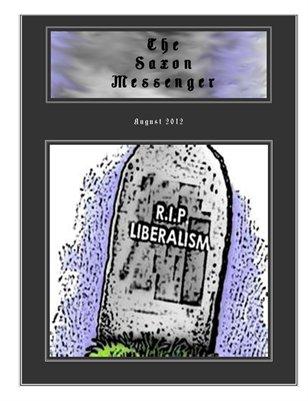Search form
September 2012
The Saxon Messenger - August, 2012
Get your copy of the latest issue of The Saxon Messenger, an online PDF magazine and a project of Christogenea.
Visit the site at SaxonMessenger.org or click the PDF icon to download the magazine. Share it with everyone that you can!
The Saxon Messenger is now available in print!
The Gospel of Luke, Chapter 16 - The Divorce Discourse, Luke 16:16-18
The notes to this podcast are already contained here in papers written years ago, Divorce in the Bible and The Divorce Discourse: Luke 16:16-18
The Gospel of Luke, Chapter 15
The Gospel of Luke, Chapter 15 - 09-21-2012
1 Then all of the tax-collectors and the wrongdoers were approaching Him to hear Him. 2 And both the Pharisees and the scribes were murmuring saying that “He receives wrongdoers and eats together with them!” 3 So He spoke to them this parable, saying: 4 “Which man from among you having a hundred sheep and losing one of them would not leave behind the ninety-nine in the wilderness and go for that which is lost until he should find it? 5 And finding it places it upon his shoulder rejoicing, 6 and coming to the house will call together friends and neighbors saying to them ‘Rejoice with me, because I found my sheep which is lost!’ 7 I say to you that thusly there shall be joy in heaven upon the repenting of one wrongdoer rather than upon ninety-nine righteous who have no need of repentance!
A lot may be said of this allegory, aside from the illustration of how valuable each and every one of the sheep are to their Shepherd, which is yet another illustration that all Israel shall indeed be saved. There are a hundred sheep, comparatively, and the ninety-nine are left in the wilderness while the one which is lost is pursued. Note that the ninety-nine are not in the stables (i.e. in Jerusalem) or in some civilized safe haven, but in the wilderness. Note also that the sheep do not seek the Shepherd, but rather that the Shepherd seeks the sheep....
Is the Constitution Christian?
Pastor Mark Downey interviews Pastor Ken Lent on William Finck's Christogenea on Talkshoe Internet radio program. Discussed were the claims by some anti-Constitution factions that the founding fathers were immoral deists undermining the Christian roots of early America.
Libertarianism Cannot be Christian
I saw my beloved brother and sister-in-law for the first time in seventeen years this past July, and I received a reminder of where I had come from. Quite a vivid reminder it was because in spite of the passing of so many years, sadly they are still there. It is not that I do not love them, for I certainly do. However once one grows in the enhanced understanding of life and world circumstances and develops the weltanschauung which many Christian Nationalists have, or should have, a journey into the past is often a trip down a memory lane that is lined with haunted houses.
One easily discussed example of our current differences may be drawn from popular music. “But you used to listen to that”, my brother said in protest when I pointed out that a certain musician was a promiscuous and deviant miscreant. Well, the ever-present strains from that FM radio of my childhood were flooded with it, so everyone used to listen to it. “You even bought one of his records!” Of course I had, but I was all of thirteen years at the time. And I can still hear and appreciate the beautiful melodies of Tiny Dancer or Your Song pierce the stale air of the distant past. But eventually I discovered the demons which lurked behind the poetical lyrics and bucolic album covers, and I hated them.
Roosevelt's Campaign To Incite War in Europe, Part 2 - September 8th, 2012
This podcast is complete from a Christogenea recording. The Talkshoe podcast was abruptly terminated a few minutes before the program actually ended, for unknown reasons.
The Gospel of Luke, Chapter 14
The Gospel of Luke, Chapter 14 – September 7th, 2012
1 And it happened while He entered into the house of one of the leaders of the Pharisees on the Sabbath to eat bread that they were watching Him closely.
The opponents of Christ had been watching to entrap Him since the “time if His coming forth”, as it says in Luke chapter 11, “laying in wait for Him to catch something from His mouth.”
2 Then behold, there was a certain edematous man before Him.
The word ὑδρωπικός (5203) is an adjective, “dropsical” (Liddell & Scott), an “edematous man” here. From ὕδρωψ, “dropsy” (Liddell & Scott), the word is an archaic term for edema, “an excessive accumulation of serous fluid in tissue spaces or a body cavity” (The American Heritage College Dictionary), and derived from ὕδωρ “water”.
Roosevelt's Campaign To Incite War in Europe, Part 1 - September 1st, 2012
This series of podcasts was based upon a 1982 paper by Mark Weber, President Roosevelt's Campaign To Incite War in Europe:The Secret Polish Documents, available at the Institute for Historical Review








 Please click here for our mailing list sign-up page.
Please click here for our mailing list sign-up page.








Recent comments